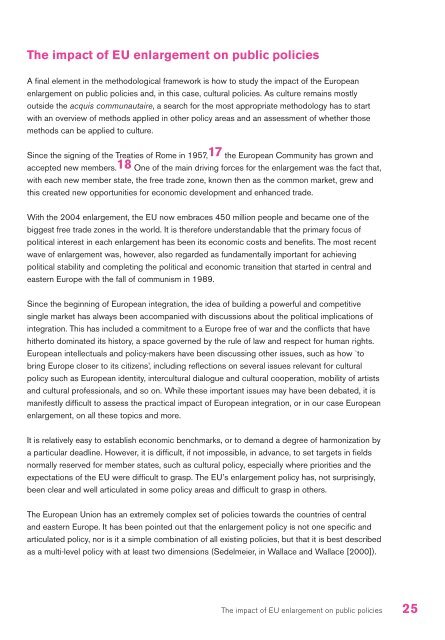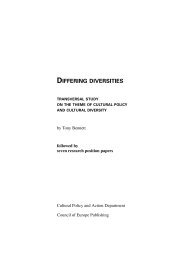a broader understanding <strong>of</strong> culture, in <strong>the</strong> sense intended by <strong>the</strong> <strong>European</strong> Cultural Convention.They also believed that some positive effects <strong>of</strong> <strong>the</strong> programme included awareness-raising andbringing a measure <strong>of</strong> order to <strong>the</strong> `organized chaos’ in <strong>the</strong> <strong>cultural</strong> sector.Most recent comparative studies <strong>of</strong> <strong>European</strong> <strong>cultural</strong> policy use <strong>the</strong> Council <strong>of</strong> Europe data.The range <strong>of</strong> obstacles and limitations encountered in its reviews – <strong>the</strong> definition <strong>of</strong> culture,defining <strong>the</strong> scope and goals <strong>of</strong> state intervention in <strong>the</strong> <strong>cultural</strong> field, <strong>the</strong> term `national <strong>cultural</strong>policy’, and <strong>the</strong> lack <strong>of</strong> reliable indicators – all support <strong>the</strong> argument that a shared <strong>cultural</strong> policyat <strong>EU</strong> level is an impossible vision and that <strong>policies</strong> about culture have to remain with individual<strong>EU</strong> member states.The role <strong>of</strong> <strong>the</strong> Council <strong>of</strong> Europe was recognized explicitly in Article 128 <strong>of</strong> <strong>the</strong> MaastrichtTreaty.16 The <strong>European</strong> Union opted, ho<strong>we</strong>ver, for a ra<strong>the</strong>r conservative approach and ignoredone <strong>of</strong> <strong>the</strong> most valuable outcomes <strong>of</strong> <strong>the</strong> Council <strong>of</strong> Europe’s programme – that is, a broadunderstanding <strong>of</strong> <strong>cultural</strong> policy as a field, which consists <strong>of</strong> all measures having a direct orindirect <strong>impact</strong> on culture. In fact, a common, narrow, interpretation <strong>of</strong> <strong>the</strong> principle <strong>of</strong> subsidiarity,has resulted in a situation in which <strong>policies</strong> and actions concerning culture remain restricted toso-called `harmless areas’, such as cooperation and exchange (Kaufman and Raunig, 2002).In <strong>the</strong> following chapters, <strong>we</strong> will look more closely at how culture is defined and understoodwithin <strong>the</strong> <strong>EU</strong>, including whe<strong>the</strong>r it is possible to justify <strong>the</strong> <strong>EU</strong>’s recent separation – in 2004 – <strong>of</strong>culture and audio-visual sectors bet<strong>we</strong>en two directorates <strong>of</strong> <strong>the</strong> <strong>European</strong> Commission; culturenow comes under Education and Culture and media comes under <strong>the</strong> Information Society andMedia. (How <strong>the</strong> Commission is going to deal with <strong>the</strong> digitalization <strong>of</strong> heritage remains to bedecided.) This contrasts with <strong>the</strong> methodology scope <strong>of</strong> <strong>cultural</strong> policy in <strong>the</strong> Council <strong>of</strong> Europe’sprogrammes, which has meant that, in that forum, <strong>the</strong>se same <strong>European</strong> states have taken a muchmore inclusive view <strong>of</strong> <strong>cultural</strong> policy, encompassing audio-visual policy.This choice <strong>of</strong> scope, used for <strong>the</strong> purpose <strong>of</strong> this study, is <strong>the</strong>refore closer to <strong>the</strong> definition <strong>of</strong><strong>cultural</strong> policy used in <strong>the</strong> Council <strong>of</strong> Europe reports, ra<strong>the</strong>r than <strong>the</strong> restrictive definition <strong>of</strong> <strong>the</strong><strong>European</strong> Union’s competence in <strong>the</strong> field <strong>of</strong> culture.The work <strong>of</strong> <strong>the</strong> Council <strong>of</strong> Europe is especially important for researching <strong>the</strong> possible <strong>impact</strong><strong>of</strong> <strong>the</strong> <strong>EU</strong> enlargement on <strong>cultural</strong> <strong>policies</strong>, because <strong>the</strong> Council <strong>of</strong> Europe was in some ways adriving force for involving researchers in broader <strong>European</strong> debates, long before <strong>the</strong>ir countriesbecame candidates or member states <strong>of</strong> <strong>the</strong> <strong>European</strong> Union. As culture has for many yearsbeen among <strong>the</strong> priorities <strong>of</strong> <strong>the</strong> Council <strong>of</strong> Europe, this has spawned close cooperation andmany collaborative research projects. At <strong>the</strong> same time, <strong>the</strong> fact that culture has not yet figuredprominently on <strong>the</strong> <strong>EU</strong> agenda has had <strong>the</strong> consequence <strong>of</strong> ra<strong>the</strong>r modest interest in research,o<strong>the</strong>r than in those areas directly covered by <strong>the</strong> acquis communautaire.24Part 1 The conceptual frame <strong>of</strong> <strong>the</strong> study
The <strong>impact</strong> <strong>of</strong> <strong>EU</strong> enlargement on public <strong>policies</strong>A final element in <strong>the</strong> methodological framework is how to study <strong>the</strong> <strong>impact</strong> <strong>of</strong> <strong>the</strong> <strong>European</strong>enlargement on public <strong>policies</strong> and, in this case, <strong>cultural</strong> <strong>policies</strong>. As culture remains mostlyoutside <strong>the</strong> acquis communautaire, a search for <strong>the</strong> most appropriate methodology has to startwith an overview <strong>of</strong> methods applied in o<strong>the</strong>r policy areas and an assessment <strong>of</strong> whe<strong>the</strong>r thosemethods can be applied to culture.Since <strong>the</strong> signing <strong>of</strong> <strong>the</strong> Treaties <strong>of</strong> Rome in 1957,17 <strong>the</strong> <strong>European</strong> Community has grown andaccepted new members.18 One <strong>of</strong> <strong>the</strong> main driving forces for <strong>the</strong> enlargement was <strong>the</strong> fact that,with each new member state, <strong>the</strong> free trade zone, known <strong>the</strong>n as <strong>the</strong> common market, grew andthis created new opportunities for economic development and enhanced trade.With <strong>the</strong> 2004 enlargement, <strong>the</strong> <strong>EU</strong> now embraces 450 million people and became one <strong>of</strong> <strong>the</strong>biggest free trade zones in <strong>the</strong> world. It is <strong>the</strong>refore understandable that <strong>the</strong> primary focus <strong>of</strong>political interest in each enlargement has been its economic costs and benefits. The most recentwave <strong>of</strong> enlargement was, ho<strong>we</strong>ver, also regarded as fundamentally important for achievingpolitical stability and completing <strong>the</strong> political and economic transition that started in central andeastern Europe with <strong>the</strong> fall <strong>of</strong> communism in 1989.Since <strong>the</strong> beginning <strong>of</strong> <strong>European</strong> integration, <strong>the</strong> idea <strong>of</strong> building a po<strong>we</strong>rful and competitivesingle market has always been accompanied with discussions about <strong>the</strong> political implications <strong>of</strong>integration. This has included a commitment to a Europe free <strong>of</strong> war and <strong>the</strong> conflicts that havehi<strong>the</strong>rto dominated its history, a space governed by <strong>the</strong> rule <strong>of</strong> law and respect for human rights.<strong>European</strong> intellectuals and policy-makers have been discussing o<strong>the</strong>r issues, such as how `tobring Europe closer to its citizens’, including reflections on several issues relevant for <strong>cultural</strong>policy such as <strong>European</strong> identity, inter<strong>cultural</strong> dialogue and <strong>cultural</strong> cooperation, mobility <strong>of</strong> artistsand <strong>cultural</strong> pr<strong>of</strong>essionals, and so on. While <strong>the</strong>se important issues may have been debated, it ismanifestly difficult to assess <strong>the</strong> practical <strong>impact</strong> <strong>of</strong> <strong>European</strong> integration, or in our case <strong>European</strong>enlargement, on all <strong>the</strong>se topics and more.It is relatively easy to establish economic benchmarks, or to demand a degree <strong>of</strong> harmonization bya particular deadline. Ho<strong>we</strong>ver, it is difficult, if not impossible, in advance, to set targets in fieldsnormally reserved for member states, such as <strong>cultural</strong> policy, especially where priorities and <strong>the</strong>expectations <strong>of</strong> <strong>the</strong> <strong>EU</strong> <strong>we</strong>re difficult to grasp. The <strong>EU</strong>’s enlargement policy has, not surprisingly,been clear and <strong>we</strong>ll articulated in some policy areas and difficult to grasp in o<strong>the</strong>rs.The <strong>European</strong> Union has an extremely complex set <strong>of</strong> <strong>policies</strong> towards <strong>the</strong> countries <strong>of</strong> centraland eastern Europe. It has been pointed out that <strong>the</strong> enlargement policy is not one specific andarticulated policy, nor is it a simple combination <strong>of</strong> all existing <strong>policies</strong>, but that it is best describedas a multi-level policy with at least two dimensions (Sedelmeier, in Wallace and Wallace [2000]).The <strong>impact</strong> <strong>of</strong> <strong>EU</strong> enlargement on public <strong>policies</strong>25
- Page 1 and 2: Why we need European cultural polic
- Page 3: 06081116171822252829313737404343454
- Page 6 and 7: Prologue When I decided to research
- Page 8 and 9: If I had the opportunity of startin
- Page 10 and 11: Measures directly referring to cult
- Page 12 and 13: obstacles encountered during the pe
- Page 14 and 15: Part 1Theconceptualframe ofthe stud
- Page 16 and 17: argument referred to identifying ex
- Page 18 and 19: Gray called for comparative researc
- Page 20 and 21: The Council of Europe and comparati
- Page 24 and 25: The first one is a `macro’ dimens
- Page 26 and 27: Part 2European Union,culture andcul
- Page 28 and 29: narrow sense - still remains exclud
- Page 30 and 31: Niedobitek (see page 29) drew atten
- Page 32 and 33: Even though the author thought that
- Page 34 and 35: In spring 2005 two founding members
- Page 36 and 37: I am focussing more on the technica
- Page 38 and 39: while enlargement negotiations were
- Page 40 and 41: ights.56 Since the mid-1990s, the E
- Page 42 and 43: This included information about Cha
- Page 44 and 45: Gradual development and introductio
- Page 46 and 47: of the background presented earlier
- Page 48 and 49: `Eventually, a solution was found,
- Page 50 and 51: In regard to other taxes, opinions
- Page 52 and 53: meet the recently introduced regula
- Page 54 and 55: introduces the possibility of makin
- Page 56 and 57: One of the recommendations in the F
- Page 58 and 59: IPR legislation into line with Worl
- Page 60 and 61: Preliminary assessmentof the impact
- Page 62 and 63: Changes in taxation policies were n
- Page 64 and 65: policy areas and the ensuing transf
- Page 66 and 67: Part 3What willthe futurebring?68 P
- Page 68 and 69: Manuel Barroso, President of the Eu
- Page 70 and 71: has been embraced by the European m
- Page 73 and 74:
Instead of a conclusionThe aim of t
- Page 75 and 76:
1 The French term acquis communauta
- Page 77 and 78:
14 When deciding on the methodology
- Page 79 and 80:
30 OJ C 336, 19/12/1992.31 1st Repo
- Page 81 and 82:
45 After the signing and entry into
- Page 83 and 84:
65 See Annex 1 for a copy of theque
- Page 85 and 86:
81 32001G0731(01) Council Resolutio
- Page 87 and 88:
culture, which needs to be exempt f
- Page 89 and 90:
Aubry P, (2000)The `Television with
- Page 91 and 92:
Draus F, (2001)`Est-Ouest, le dit e
- Page 93 and 94:
Futo P, Cuculić J, et al (2002)Met
- Page 95 and 96:
Laher L, (2001)Trapped in the notio
- Page 97 and 98:
Puchala D J, (1971)`Of blind men, e
- Page 99 and 100:
Weidenfeld W, Wessels W, (1997)Euro
- Page 101 and 102:
2. In your opinion, have the cultur
- Page 103 and 104:
13. Have there been any changes in
- Page 105 and 106:
Annex 3List of CPRA jury membersMil
- Page 107 and 108:
Political Economy Cultural Economic
- Page 109 and 110:
Annex 4GlossaryAcquis communautaire
- Page 111 and 112:
Cultural marketsA term used to desc
- Page 113 and 114:
Third countriesEU documents sometim
- Page 115:
Author: Nina ObuljenEditor: Janet H














